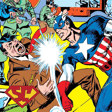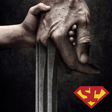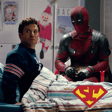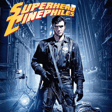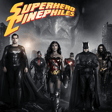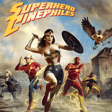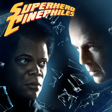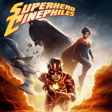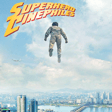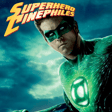Become a Creator today!Start creating today - Share your story with the world!
Start for free
00:00:00
00:00:01

Iron Man 2 (2010)
Author John Bruening is back on the show and this time, we revisit Iron Man 2. We discuss the recasting of Rhodey, address the film's less-than-stellar reputation, and talk about how we'll still take this over Iron Man 3.
Visit FlinchBooks.com to find out about all the books John is involved with.
Want to tell us what you think? Have any questions or comments for Perry about superheroes in media or comics? Leave a voice message to play on the show. You can also apply to be a guest on the show.
Recommended
Transcript
Iron Man's National Security Debate
00:00:15
Speaker
As he does not operate within any definable branch of government, Iron Man presents a potential threat to the security of both the nation and to her interests. I did, however, go on to summarize that the benefits of Iron Man far outweigh the liabilities, and that it would be an interest to fold Mr. Stark into the existing chain of command. I'm not a joiner, but I'll consider Secretary of Defense. If yes, nice. We can amend the hours a little bit.
00:00:43
Speaker
I'd like to go on and show, if I may, the imagery that's connected to your report. I believe it is somewhat premature to reveal these images to the general public at this time. Colonel, I understand. And if you could just narrate those for us, we'd be very grateful. Is that the images?
00:01:01
Speaker
Intelligence suggests that the devices seen in these photos are in fact attempts at making manned copies of Mr. Stark's suit. This has been corroborated by our allies and local intelligence on the ground indicating that these suits are quite possibly at this moment operational. Hold on my second, buddy. Let me see. Oh, boy, I'm good. I come in here for screens. I need them. Time for a little transparency.
00:01:30
Speaker
No, let's see what's really going on. What is he doing? If you'll direct your attention to shed screens, I believe that's North Korea. Turn that off. Take it off. Iran. No grave immediate threat here. Is that Justin Hammer? How did Hammer get me?
00:02:00
Speaker
Justin, you're on TV, focus up.
Stark's Privatization of Peace
00:02:07
Speaker
Wow.
00:02:14
Speaker
Yeah, I'd say most countries five, ten years away. Hammer industry is 20. I'd like to point out that that test pilot survived. I think we're done is the point that he's making. I don't think there's any reason I can do that. The point is, you're welcome. For what? Because I'm your nuclear deterrent. It's working. We're safe. America is secure. You want my property, you can't have it. But I did you a big favor. I have successfully privatized world peace.
00:02:46
Speaker
I tried to play ball with these ass clowns. Fuck you, Mr. Stark. Fuck you, buddy. We're adjourned. We're adjourned for today. Okay. You've been a delight.
Introducing Perry & John
00:02:57
Speaker
Welcome to the Superhero Cinephiles podcast. I'm your host, Perry Constantine, and welcoming back a returning guest, and that is John Bruning. John, how you doing today? I'm good, Perry. Thanks for having me again.
00:03:07
Speaker
Well, thanks for coming on. Always a good time to have you on the show. And since we've had you on fairly recently, we don't have to go too much into your background and all that. We can just jump right into stuff. And so let's just give a brief recap just very quickly who you are and what you do, basically. Sure. I am a writer, editor, publisher, co-founder of Flinch Books, which I
00:03:30
Speaker
launched with my partner Jim Beard in 2015. I'm the author of the Midnight Guardian series, which started in 2016 with a book called Hour of Darkness and continued in 2019 with a book called Annihilation Machine. And the most recent installment is God and Sinners, which was published at the end of 2022. Book number four is in the works. Don't ask me when it's going to be done, but it is in the works. I've also had other stories published by
00:03:55
Speaker
Short fiction published in Moonstone Books, Blue Planet Press, Becky Books, Stormgate Press, and others. So I'm pretty much writing all the time.
00:04:04
Speaker
Yeah, I know what that's like. And also on the, you know, a book in progress, I'm not sure when it's going to be finished. I just completed the next book in my Dark Crossroads universe of novels and one of the, yes, thank you, number 35, I believe. Not counting the two, I've got one unpublished manuscript that's sitting with Tommy Hancock and has been for a while now.
00:04:29
Speaker
And I've got another one that just hasn't been published yet that I was doing because the sales on the first two books weren't that good. But when I find some time, I might actually go through and go through the rubble of getting it fixed up and ready for publication. But so, yeah, if those two come out, then this is actually number 37, I think. But you're 37 puts my four to shame, but everyone has the right. I've also been doing it. Yeah, everyone has their own pace. And I've been doing this for like what?
00:04:58
Speaker
15 years now and, you know, different and mostly just been doing novels. Like I don't do a whole lot of short stories like you do, like you do so. And so that's that's. But I've I've had these situations where like I started working on this book in January and I had timed it all out and I'm like, OK, so I start this book in January. I should be able to finish it by by early February. And then it's, you know, early March. I end up finishing up instead. I definitely know.
00:05:25
Speaker
You have one or two small children. I don't remember how many exact two. OK, so the mere fact that you're getting anything done is pretty astonishing. So, you know, if you're if you're a few months behind, I'd say you're still ahead of the game if you if you're like a couple of little kids in the house. So, yeah. So good on you for that. Thank you. Yeah.
Exploring Writing and Gaming
00:05:43
Speaker
But anyway, you know, why don't we talk a little bit about what kind of stuff we're into lately? Anything you've been watching or reading or anything that's kind of caught your interest these days?
00:05:54
Speaker
uh gosh um my wife and I are viewing tastes are pretty much all over the place um but personally my own stuff i i'm kind of um i'm i'm i'm diving more into uh crime fiction lately in the last year or so um also westerns which seems like an odd you know an odd combination but uh
00:06:16
Speaker
That's just sort of the way it's been, but definitely crime fiction from both some current writers like Max Allen Collins and Terrence McCauley, as well as some past writers along the lines of Ed McBain. He's a longtime favorite of mine. I'm deeply committed to finishing his 87th Precinct series. I think there was something like 50 books and I'm maybe about halfway through.
00:06:43
Speaker
So but yeah, definitely doing a deep dive into crime fiction in the last year or two. Very cool. For my part, I you know, I just got a PlayStation five. They they're they had it on sale. Finally, like the lowest price I've ever seen it. And and we just kind of stopped in the store and I'm like, oh, my God, it's like the you know, it's like I told my wife how much it is. She's like, why don't you buy it then? I'm like, really? She's like, yeah, I'm like, OK, then I got the green light. I can go buy it.
00:07:08
Speaker
That was easy. So yeah, yes, like the the past few days have just been like consumed with Final Fantasy 7 Rebirth because it just so happened to that the day I bought the PS5 was also the release date of Final Fantasy 7 Rebirth. And I don't know if you're any a gamer of any sort at all, but that is the original Final Fantasy 7 was like my favorite video game of all time. So when I'll tell you that is that is a whole I'm sorry, go ahead.
00:07:34
Speaker
I was just saying like the remake when that came out a few years ago, I dove into that, you know, devoted like, you know, several days just to completing it and then
00:07:45
Speaker
And I think it was about like a month or two ago, I had went back and I had replayed it because of the new one was coming out and now the new one's coming out, I dove right back into it and I'm just loving it. There's so much to do in it. It's such a massive world and I'm torn between wanting to go through and complete all the side quests, which I usually don't do. I usually just go straight through the main story stuff.
00:08:10
Speaker
But there's just so much to do and it's so interesting to explore this world that I've always wanted to see more of. So it's been wonderful. That is a whole slice of pop culture that I have stuck my toe into gaming, but never taken the deep dive. And then my son came along. By the time he was like,
00:08:30
Speaker
six or seven, maybe he would want me to sit down and play games with him. And he was already like light years ahead of me in terms of skill. And it's like I'm getting beaten by a seven or eight year old. It was just humiliating. I just saw this all the more reason why I just sort of backed away from the whole thing. But yes, yeah.
00:08:50
Speaker
He's 20 now, and yeah. He's always better now. Yeah, my kids are, they're still very young. My daughter's only three, but she is starting to get a little bit more interested. And like when I'm playing, like she starts, there's, we have an old controller nearby. And so like whenever I start playing, she comes in and she takes this old controller that's not connected to anything. And she sits on my lap and she pretends to play with me.
00:09:15
Speaker
Yeah, but like she was at her meeting you she will be yeah, she will be both her and my son definitely but she was at my my in-laws house last night and she stayed the night with her cousins and My wife was there too. My wife took a picture of her Sitting next to her older cousin who was playing a Nintendo switch just staring at the game the whole time So I think she's starting to get into that mode
00:09:39
Speaker
Yeah. Yep. They start early. They start early. And it's not that surprising. Like I started, I got my first, I got the first Nintendo when I was like five, I think. So, so she's definitely getting close to that age.
00:09:52
Speaker
I'm from the Atari generation when it was just like a little, I mean, I grew up in the 1970s, so it was pretty primitive in those days. And I had a buddy down the block who had that. He loved to play that. He was all over that for years. And at the time, all it was is just a little rectangle that moved across the screen bouncing a ball back and forth. It was so primitive, it was funny.
00:10:17
Speaker
But he loved it. And I just, you know, that's, that's the extent of my gaming. That's, that's, that's where I started. That was my first generation of gaming. So like, when my kids are growing up with it, now it's a whole different world. Yeah, I remember too, back on the, the old NES. And, you know, I, I've got a recall box now. So I've got those old games too. And every now and then I'll just go and play, play them. And it, it's so funny, the things that I was amazed by back then. And I'm just like, compared to what we have now, it's unbelievable. Yes. Yeah. Yeah.
00:10:48
Speaker
And it only takes a few years to leap another generation. Oh, yeah. I mean, the PlayStation 5 has only been out. It came out, what, 2021, 2020? And now Sony is already saying that it might be reaching its end of life. I'm like, it just came out.
00:11:04
Speaker
Yeah. Yeah. It's not even out of the box yet. Come on. Give me a break. I know. Yeah.
Iron Man 2: Critique and Appreciation
00:11:10
Speaker
Anyway, today, well, speaking of older things today, we are going to be talking about doing a throwback to the early days of the MCU, talking about Iron Man 2, which has been a hole in the show's MCU coverage. This is a movie that nobody's brought up yet until you suggested it. And it's a movie that I've always
00:11:29
Speaker
been interested in going back and revisiting because I think it's a movie that gets a lot of undue hate. I agree or at least maybe hates a strong word but yes it certainly gets criticized or dismissed as a weaker entry and I don't know if it necessarily is.
00:11:47
Speaker
I think I would maybe agree that it's a weaker entry, but that's not necessarily a bad point about the film itself. It just shows how much better some of the other films have been since then. Right, right, right. And especially when you're comparing it, it was 2010? Yeah, 2010, yes. I just watched it again yesterday, and I meant to check the date. I think it was 2010.
00:12:14
Speaker
Yeah, I got the IMDb page up here. So yeah, it was 2021, you know, big sequel. And this was like the first, this is like the first real,
00:12:24
Speaker
entry into the mcu this is like when the mcu really starts because you know iron man they had they had shot the nick fury cameo at the end but that was just kind of like a throwaway thing they did not expect that to lead lead lead anywhere it was that whole movie was marvel's hail mary pass to get out of bankruptcy and it was just kind of like well let's throw in they they were able to get samuel jackson for the day and they're like let's just have him come in and do this little do this quick scene and then that'll be that and then
00:12:54
Speaker
We don't know if we'll even be around by the time this movie is done. So we'll just put it in there and it'll be and, you know, worst case scenario, it's a fun little Easter egg for the fans. Right. And then by the time Iron Man 2 comes along, you've got you've got Nick Fury, you've got Natasha Romanoff, you've got
00:13:14
Speaker
Uh, and you get it at the post-credit scene, you get a quick glimpse of Thor's hammer. So clearly, we also have, uh, we have cap shield in it as well, or like a prototype of his shield or whatever. Yeah. And, um, yeah. And, uh, also, you know.
00:13:29
Speaker
when Incredible Hulk came out, that too. They're like, all right, well, let's just throw some stuff in there. And when Iron Man had done so well, they quickly, you know, scrambled to do this cameo with Robert Downey Jr., which they put at the end of the Incredible Hulk.
00:13:45
Speaker
But that ended up causing some continuity problems between these movies because people weren't quite sure. John Favreau was kind of like, well, I don't want him to necessarily be all in with S.H.I.E.L.D. right from the start. So we have this back and forth. And then so now we find out when the timeline comes out that this actually takes place like
00:14:06
Speaker
Before the Incredible Hulk so it's like Iron Man Iron Man 2 and then it's like the Incredible Hulk and Thor all happen like within the same You know Iron Man 2 Incredible Hulk and Thor all happen like within the same frame of time, right? Right. Okay. So yeah, it was a little bit of a mess continuity wise but Because because by the time by the time they got deeper into the whole saga and
00:14:29
Speaker
it was always kind of astonishing to me how well they wove it all together, and they had it all sequenced out in a way that made sense in the real world. So the idea that there was once a time in this whole world building when the world didn't look too clearly defined. One of the interesting things about what Marvel does, and I think this is a good lesson for a lot of writers out there, is that
00:14:57
Speaker
they're very good at the illusion that they have everything planned out. But when I talk to people who have actually worked behind the scenes, they're like, no, no, no, Marvel changes their mind all the time. So it is interesting. It's it's pretty uncanny that they've managed to have it be as cohesive as it is for as big and as sprawling as it is, even though they're just they're basically playing jazz a lot of the time with it.
00:15:18
Speaker
And that happened with this movie, like the first the first Iron Man movie, they were basically writing the script as they were filming. Downey was apparently ad libbing a lot of stuff during this movie, and that caused a lot of onset rewrites for Justin Theroux. So there are a lot of little things like that happening. Before we dive too much into the movie, what's your history with Iron Man as a character?
00:15:41
Speaker
Oh man, I would say my initial introduction to Marvel Comics was probably Iron Man, and I couldn't tell you the issue number, but I would say it dated somewhere around 1973. I can picture the cover, he's going up against Ultimo, and he's also up against, I believe the character was Sunfire, sort of a Japanese
00:16:07
Speaker
Japanese counterpart to Iron Man. I'm gonna say the year was roughly 73 and I was hooked on Iron Man for a long time which is why I was kind of surprised when the MCU started to unfold and they were sort of making they were making Iron Man sort of the the the linchpin of the whole
00:16:26
Speaker
Franchise and I was hearing talk of like, you know How interesting it was that they were taking this second tier character and making him the main focus of the entire franchise And I'm here thinking second tier. I've been in love with this guy since I was 10. So So yeah, my my my association with Iron Man goes goes back to a very young age I was I was hooked on Iron Man. I'd say my my iron my my Marvel comic book collection, which I still own I would say that I've got a probably about a
00:16:54
Speaker
120 issue run of Iron Man comics going from early 70s to probably the I'm gonna say the early to mid 80s.
00:17:02
Speaker
You see I was I was never much of an Iron Man guy like I I came in through like with most Marvel stuff I came in through the the animated series in the 90s So they had you know, they had the X-Men spider
Iron Man's Evolution and Impact
00:17:13
Speaker
-man on Fox but on I think it might have been UPN at the time, but it was like the Marvel Action Hour was Iron Man and Fantastic Four and The the Fantastic Four show gets a lot of hate at these days like it even mocked it in the comics itself But the Iron Man show it had like
00:17:32
Speaker
It was only two seasons and it was very schizophrenic. Like the first season was very much like standard late 80s, early 90s, you know, action cartoon type thing, right? It's, you know, very like matches the matches the universe GI Joe type of feel where it's like you have your group of heroes, you have your group of villains and every episode they they throw down.
00:17:53
Speaker
And then the second season, they had brought in like a new showrunner, a new creative team, and they just basically kind of retooled the whole thing. They tossed out all the Force Wars characters. They they brought it. They they focused it much more on Tony Stark and like his issues and his problems. And and yeah, it was.
00:18:12
Speaker
It's been years since I've watched it, so I don't want to say it was underrated gem or anything, but it was a nice little introduction to me, to that character at the time. And it was one of the first examples of showing the cinematic universe stuff. It had crossed over with Spider-Man, and Spider-Man had also crossed over with X-Men. So we did have this whole little animated universe back then, in the early 90s, in a few small cases.
00:18:42
Speaker
You mentioned Tony Stark's personality issues. The funny thing about, as I said, I was reading Iron Man comics in the early 70s. The writers hadn't developed much of that at that point. The Iron Man that everyone knows today, ever since the dawn of the MCU, Tony Stark was kind of like this
00:19:07
Speaker
narcissistic dickhead, whereas when I was reading Iron Man comics in the early 70s, he didn't have any of that going on. I think he struggled to have meaningful relationships with women because he was sort of preoccupied with being Iron Man, but it wasn't like he was walking around with this enormous ego that he developed later by subsequent writers and filmmakers.
00:19:30
Speaker
Yeah, I had started to dive into the comics. I'd read a little bit of music's run back in the late 90s when they came off Heroes Reborn. I had read the Heroes Reborn stuff as well. I think that was like kind of like my first real introduction to him in the comics. And then, which is not bad, actually, like I know the Heroes Reborn stuff gets a lot of hate, but I thought like the Fantastic Four and the Iron Man stuff were, I mean, not great, but not bad, not as bad as I think like the Cap and the
00:19:59
Speaker
Avenger stuff that Liefeld was doing. Right. And then, you know, I dived into the music stuff I'd read the I and in and out of like Joe Quesada did a run, you know, Frank Thierry did a run and he was always Iron Man was always a character that I was interested in conceptually, but something about these different comics, they just never really grabbed me that much and
00:20:24
Speaker
And it wasn't until the movie that when the movie came out and, you know, and like you said, yeah, he didn't really have this kind of personality he's known for in the comics. There was a little bit of arrogance there, but it was it was not the kind of arrogance that you see that Downey brings to it. And it definitely was not like the kind of snarky arrogance that he has. Right. Right. And then once I'd read the once I'd seen Downey and I'm just like, oh, my God, this is this is a really interesting take. And it.
00:20:50
Speaker
It makes sense that he would be this kind of character, right? You've got this guy who he thinks he knows he's the smartest guy in the room. He's going to make you the only way to make a character like that likable is to give him a bit of snark. Otherwise, you're just going to hate him. Right, right. It's it's yeah. And it's funny how yes. And when and then you then you brought Captain America along and you you juxtaposed the two in the Avengers and there couldn't be a more incongruous, you know,
00:21:19
Speaker
pairing than those two and which which i think was intentional it made for some great you know great storylines in the movies yeah yeah i remember um van ellen plexko who's been on the show before he had talked about how um one of the problems that um the the mcu had was that they basically gave when they gave they basically gave hawkeye's personality to iron man and then they'd had nothing for hawkeye
00:21:43
Speaker
Right. I think that's I push back on that a little bit. I think that's a little bit of an oversimplification. But I think there is kind of a truth that you see a lot of the a lot of the differences, a lot of the arguments that Hawkeye and Cap would have in the old Avengers comics. They do see more like conversations that Tony and Steve are having in the movies. Right. Right. I think
00:22:05
Speaker
In the earlier days of the comics, I think the star of the Iron Man comics was the tech more than the person inside of it. I don't know if I consciously knew that when I was 10 years old, but looking back on those stories,
00:22:19
Speaker
It was, you know, I think that the fascination was look at all this cool stuff this guy wears on his body. It becomes a becomes like a basically a human weapon. Whereas it wasn't until subsequent years that they actually started diving into the character of Tony Stark and what, you know, what he meant to the equation.
00:22:36
Speaker
right yeah and of course i'd read the the demon of bottle story at some point which is you know one of the classic iron man stories um sure but yeah the comics just never really grabbed me too much so when the movies came along it and and that that first iron man movie was just um
Superhero Cinema Transformation
00:22:53
Speaker
It's funny because that year we had Iron Man and the Dark Knight, these two superhero movies that basically changed the landscape of superhero movies, but in two very different directions. So in. Yes. Before this, it was all just, you know, origin stories and it tended to be superheroes who were put upon, who didn't really like being superheroes like the X-Men or Spider-Man or that kind of thing. And then you had Iron Man come along and here's this guy who is a superhero and he thinks it's the greatest thing in the world.
00:23:23
Speaker
And he's having fun with it. He's enjoying it. He's, you know, open about it. And that was so different for superhero movies at that time. Right. And then the flip side, you had The Dark Knight, which is this much more very grounded, very kind of grittier, more, you know, quote unquote realistic take on superheroes. So you had these very two different visions and they just kind of set the stage for the superhero movie landscape for like the next 15 years or so.
00:23:51
Speaker
Well, and if you think about it, I mean, Tony Stark and Bruce Wayne are very similar, you know, crazy rich, crazy smart, almost walking around with some kind of a death wish. I mean, just in terms of just like, they're willing to do just about anything to, you know, to do the job. And they arm themselves completely with all kinds of tech and gadgetry and whatnot. And it's almost like, you know, two different versions of the same guy in some respects.
00:24:15
Speaker
Yeah. Yeah. I mean, I think the main difference is that whereas the billionaire playboy thing is just a mask for Bruce Wayne. That is what Tony Stark really is. Right. Right. Exactly. I think that's one of the funny things about it. Yeah.
00:24:28
Speaker
And, you know, bringing in Robert Downey Jr. was just a stroke of genius because he, it is very hard to make a character like this likable. And you need someone like Downey to make this, I mean, let's be honest, like Tony Stark is, like you said, he is a dick. He is definitely a dick. He's an asshole to everybody. You know, he treats his friends like shit. He treats women as disposable. And he's a war profiteer. Like there is nothing to like about this guy at all. Right, exactly.
00:24:58
Speaker
And he's a, he's a nepo baby too. Like there's not one thing redeeming quality about him. So giving him Downey's personality really kind of made you, made people gravitate towards this character.
00:25:10
Speaker
Well, I think I think his one redeeming quality was he was quick with the one liners, which I think a lot of people like. Yeah, that's it. I mean, it's like it's like you know, you walk away thinking, I wish I could be that fast in the in the face of, you know, just I'm not you just. But but but yeah, for the most part, I mean, you kind of wind up liking him in spite of who he is and what he is. Yeah, I mean, you know, talking about the talking a good example of that is the conversation he has with
00:25:39
Speaker
the reporter in the first movie when, you know, you're watching that scene and you're like, oh, yeah, yeah, go on, Tony, you know, you know, you know, stick a tumor and everything like that. And, you know, pun not intended. But then afterwards, I'm thinking about that scene. I'm like, wait a minute. I disagree with every single word that's coming out of his mouth. Right. Exactly. That's what I'm getting at. Just sort of like it's like on one hand, you think he's a dick. On the other hand, you think
00:26:08
Speaker
Not many people think fast enough to have that kind of banter, but I guess part of that is good writing, part of that is good ad-libbing on the part of the actor, which I think was happening in both cases.
00:26:23
Speaker
So anyway, they put this movie right into production after the first one was so successful. And based on the success of the first one and to a lesser degree, the Incredible Hulk, they're just kind of like, you know what, now we are doing
Expanding the MCU
00:26:34
Speaker
the MCU. And this was kind of like, this movie was setting the stage for a lot of the MCU. So you got the references to Thor and Captain America. You've got Natasha in here. You've got Jackson coming back in. And in fact, Jackson's role was not even confirmed for a while because he had some
00:26:54
Speaker
there were some negotiation issues with Marvel and he was actually said in interviews that at the point that he wasn't sure if they were going to be able to get it together and he was going to be able to play Nick Fury and then eventually they'd managed to sort everything out thankfully and they got signed him for like an unprecedented at the time nine picture deal yeah that's crazy i remember that it's just like you know that that's when you started to realize
00:27:18
Speaker
This was going to be a long haul for these movies when you start when you when you started to hear how how many movies these people were signing on for. That's when you realize, OK, we are we are we are building something enormous here.
00:27:31
Speaker
But you're right, Sam Jackson's screen time in the second Iron Man movie, it's meaningful, but it's not that long. I mean, it's just basically a conversation in a diner and then another conversation where? In Stark Tower, I think, or? And then, yeah, his house, yeah. It's three conversations. They have a conversation in the diner, then he pops up at Stark's house a little bit after, and then at the end, they're having this secret safe house or whatever. Yeah, OK, right, right, OK. Yep.
00:28:02
Speaker
But yeah, that's it, just those three scenes, that's it. And I think even in the credits, it's guest starring Samuel L. Jackson.
00:28:08
Speaker
Right, right, I don't think he's on screen for more than 10 minutes, if that's- No, probably not, yeah. But I think one of the big things we got here too, and a massive change that would last throughout the whole MCU so far, is the very first recasting in the universe. Well not, yeah, this one, and then also Howard Stark gets recast as well. But here- Yes. But in the first movie, he was just a picture anyway. But here, we get Don Cheadle taking over for Terrence Howard.
00:28:36
Speaker
I think that's a good place to start because this is something that I think that's the thing that people talk about the most about this movie is that recasting. Yes. How did you feel about that change? You know, I had I had mixed feelings early on when when the movie first came out, because I was hearing that there was some bad blood between between Terrence Howard and and and Downey, I think, and and and the producers at Marvel in general, like,
00:29:03
Speaker
Terrence Howard kept waiting for the phone call that never came. But then seeing Cheadle in the role, he just seems more, especially like in the military parts that he plays, like when he's in uniform, when he's being the Colonel, I think he carries himself better than Terrence Howard did in the same role, just in terms of his presence. So in that respect, I think
00:29:31
Speaker
I think he I think it was a change for the better, especially given the arc of Rody's character throughout the remainder of the entire MCU evolution all the way through Endgame. I don't know if Terrence Howard could have done that as well as Don Cheadle did. Yeah, I mean, I liked Howard in the first movie. As for the bad blood, there have been so many different stories about this. Yeah. Yeah, I know. It's tough to see where the truth lies. Exactly. Yeah.
00:29:59
Speaker
But one of the things that I really realized that Cheetle works better at than Howard is in the friendship with Tony aspect because in the first movie, it almost feels like Rhodey is only, quote unquote, friends with Tony because he has to be, right? It kind of feels like, you know, the military is just like, just be nice to the guy, just play nice with him, you know, laugh at his jokes, that kind of thing. But in this one, I get the sense that
00:30:27
Speaker
you know, Rhodey and Tony are actually friends. Like the scene when he goes in to read Tony the riot act and he sees that he's got this problem. He's like, he's like, wait, are you he switches on a dime? Exactly. It's it's like, yeah, he's he's scolding him and then he takes a look. He looks at his face and he realizes, wait a minute, you're you're a mess. Something's wrong here. And you're right. His tone changes dramatically in that moment.
00:30:48
Speaker
And even in the Senate hearing, he keeps trying to, he's reading this report, but he's also trying to defend Tony at the same time. And Cheetle does a very good line, does a very good job of walking that line between someone who is supposed to be Tony's conscience in a kind of way, but also
00:31:12
Speaker
someone who still genuinely does care about him. So he does this very good job. And even when Tony continues to go farther and farther off the deep end, of course there's the birthday party that just goes completely awry. Even then, when Rody's
Iron Man 2's Narrative Flaws
00:31:28
Speaker
getting frustrated and angry, he's still trying to take the high road and say, look,
00:31:32
Speaker
You know, cut it out, get it together. I don't want to do this. But if I got to take you down, I got to take you down. Yeah, you can tell he's you're right. He's willing to go to the farthest possible extent to rescue Tony from himself as only a friend would. Yeah. Anyway, what are some other things that jumped out to you rewatching this movie?
00:31:58
Speaker
You know, at the outset of this conversation, we said that we both thought it was a better movie than it got credit for. And I believe that's true. But having said that, I think there are certain flaws that I think are worth noting. And I don't want to call them plot holes, because I think that's maybe too strong of a phrase. But there are these momentary, there are these momentary lapses in, I don't know, continuity or logic that
00:32:27
Speaker
strike me as strike me as odd like I could see how people might be a little bit irked by that and they may seem like small things but if you like add them all up I mean just a couple come to mind it like okay we get our first glimpse of Natasha Romanoff under the guise of what do they call her Natalie Rushman I think and um supposedly she's this sort of legal person on the stark payroll
00:32:52
Speaker
And she shows up with paperwork for Tony to sign to transfer the control of the company to Pepper. And so she's sort of like this legal operative working for the company. That's her cover.
00:33:05
Speaker
Yeah, I'm guessing like a paralegal or something along those lines. Right, exactly. You know, who happens to be really attractive and Tony's immediately, you know, but, but then, like, a few scenes later, Tony's getting ready to go to this birthday party. He doesn't really want to go to, because he's, he knows secretly this, you know, his, his, his, his, his heart, you know, his, his course, what is it, the reactor core in his chest is making him sick and probably killing him. And he's very, he's very, you know, reluctant to go and he's just,
00:33:34
Speaker
And Natalie Rushman walks in with a box, and she's asking him, which wristwatch do you want to wear to the party? And I'm watching this, and I just noticed this for the first time, and I watched it again yesterday, I think it was the fourth time I've seen the movie. I'm thinking, how did we get from paralegal to
00:33:56
Speaker
wardrobe consultant. How did we get that? So I think that was that was kind of explained, actually, because there's the scene when she comes in and when she's when, you know, happy is, quote unquote, giving her the boxing lesson. And Tony and Pepper are talking and Tony and it's so rapid fire. It's very easy to mess. But Tony saying like, you know.
00:34:15
Speaker
Yeah, because, you know, Pepper's just now taken over as CEO. And Tony says, well, I still need a personal assistant now. I need someone to take over for you now. OK. And he's like, I need someone right now. And I feel it's I feel it's her. And so that's kind of where that that all unfolds, is that she's she's this she ends up becoming his personal assistant now. Mm hmm.
00:34:34
Speaker
I don't know about the inner corporate workings. If it'd be normal to have someone from legal department go to become someone's personal assistant or anything like that. So maybe that's another question. Well, it felt kind of like, you know, given the dialogue that takes place in that brief scene where he's getting dressed for the party, it almost felt like, OK, let's find let's let's contrive some reason to get this really attractive young paralegal into Tony's private quarters so they can have this vaguely
00:35:03
Speaker
erotic conversation, you know, it just I mean, it's almost like it was almost like it felt like it was sort of set up to create that scene. Whereas, you know, that just it just struck me as a little bit odd that this paralegal suddenly becomes this sort of intimate assistant to this guy. And am I
00:35:23
Speaker
I might be wrong on this. I'm not as up to date on Silver Age Marvel, but did Tony and Natasha have a thing in the comics? I feel like that's something that happened, but I'm not quite sure. I know she did with Daredevil and Hawkeye, but I can't recall if she had something with Tony.
00:35:39
Speaker
In the time that I was reading reading Iron Man comics, I do not recall any such liaison. OK, I remember there were there were like, again, this goes back to like the early 70s. So, you know, I mean, I may not be the right guy to ask, but I don't remember any like any kind of relationship between Tony and Natasha in the time I was reading Marvel Comics. But but that, you know, that may have happened subsequently. I don't know. OK, like that was just in the back of my mind. I couldn't recall if that was something that actually happened or if it was something I had made up in my head.
00:36:09
Speaker
Um, but, uh, well, I mean, it was a good thing to, no, go ahead. Sorry.
00:36:16
Speaker
I was just kidding. It was little things like that that struck me as like, you know, little sort of hiccups in logic that I struggled with a little bit. But I'm sorry, you were going to say that. No, there. Well, I'll get back to that because I do want to pick up on this because I think you're right. I think there are some little there are some different things here. The story in this movie, I think, could have used a few extra drafts like there's there's some things that don't quite fit together.
00:36:41
Speaker
I still don't understand the whole element thing. And I've seen this movie like about a dozen times. And I still don't understand why Howard Stark is hiding the secret to this new element in the fricking model of the Stark Expo and just praying that Tony will discover it someday. That's a good question. I mean, I think he says in that film that he makes for Tony, for future Tony, he says,
00:37:09
Speaker
Something like, I'm limited by the technology of my time. In other words, I want to create this element, but I can't because I don't have – the technology does not exist yet for me to do it. But your point is a good one. Why does he make it such a secret? Maybe because he knew it would be such a powerful secret that he could only entrust it with his son and not just sort of share it with his son.
00:37:31
Speaker
his colleagues of the day. I don't know. I mean, because obviously he was working. He was working with a Russian guy who wound up being a spy. So, yeah, it's right. Yeah. Well, there's also the thing with because Fury knows some stuff about this, too. And it's like, why not? I mean, I understand you want to keep it so that only Tony can access this secret, but
00:37:51
Speaker
I mean, as we find out in later movies, he had the technology to like lock it behind like a biometric safe or something. And he's told Fury enough that Fury knows this secret is out there. So it feels like if there's a I don't know, it just felt it felt like an odd thing to just it felt very national treasury in a way. Well, and not to mention that like it becomes pretty apparent throughout the entire MCU saga that like
00:38:21
Speaker
And Tony even says it in this movie. Howard didn't have a really high opinion of Tony as he was growing up. So how did he have the faith in Tony to say, okay, I'm gonna pass this knowledge of the secret along to my kid. And so when he's old enough, he can do something with it. If he felt that, if he had that much doubt about whether his kid was gonna amount to anything or amount to much, why save it for him?
00:38:50
Speaker
Yeah, there's the I feel like a lot of the the development Tony goes through in his relationship with Howard in this movie. It feels like they forgot that happened in later movies, so they kind of go through the whole thing again, like Civil War and in an endgame. Yes. Yeah, no matter how much peace gets made early on, Tony's still grousing about his relationship with his father in subsequent movies.
00:39:13
Speaker
Yeah, I agree. I agree. So yeah, that was and even so I don't understand how he's able to make this element. I don't under that whole sequence just feels like we need some we need some hardware technobabble stuff. It looks like he's essentially building like a particle accelerator in his workshop. And but yeah, but then like he sort of bends the beam, you know, takes out half of his shop to do it. And he like focuses. It just yeah, it just sort of like
00:39:43
Speaker
It was sort of like faux science to satisfy. I don't know. It was very unusual. I wanted to know exactly what are you doing here and how are you doing this. For all the tech he's got at his disposal, he winds up shoving a wrench into a slot and turning the beam in the direction where it will intersect with this other element on the wall and it just sort of blasts into a new element. I realize you can't explain
00:40:12
Speaker
You know, you can't explain that kind of physics at that level in a two hour superhero movie, but at the same time, it's sort of like what exactly is happening here? Yeah. Yeah. It feels like they wanted it feels like someone in the studio is like, you know, you know, that that cool scene when Tony was in his workshop, we need something like that in this movie, too. Yes. Yeah. That's really kind of what it feels like. But the particle accelerator stuff, I actually looked this up and they had asked.
00:40:37
Speaker
some physicists about this and they're like no it is actually possible to build your own particle accelerator in your house like there have been teenagers who have done it okay um but then but one person's like now the big thing is like i don't know why he's in the room with that thing when it's going off
00:40:53
Speaker
Well, yeah, and like and like I said, he's just sort of like he's he's he's turning the beam in the direction of his choice. It's just like, is that something you know, if you're talking about a particle moving on a path at something close to the speed of light, do you really have that kind of a control over that kind of a, you know, I mean, and is that really something you just want to be toying with without very carefully calibrating what you're doing? Now, here's a funny thing. Do you know what that element is called?
00:41:22
Speaker
I don't think it ever gets a name, does it? I mean, so it doesn't get a name. It doesn't get a name in the movie. But apparently in there was a there's a comic book like an Avengers prelude comic called like Fury's Big Week or something. And in that they talk about how Fury how Tony had tried to patent the the element under the name Bad Assium.
00:41:44
Speaker
That sounds about right, yeah. But also the last time when I just watched this yesterday, I'm thinking, okay, so he's created this new element. And I was trying to remember, do they name this thing? And I never heard a name. So yeah, it never forget the name in this movie. No, yeah, it doesn't get a name in the movie. But the novelization, they tried to establish that the element they established in the novel, that it's that it's vibranium.
00:42:07
Speaker
And he ends up creating vibranium, but obviously that didn't end up, you know, obviously when they got to Captain America, that didn't happen. So no, that was pretty much ignored by the by the screen by the movies right right off the bat.
Character Introductions and Contrasts
00:42:19
Speaker
But also, well, let's talk a little bit about Natasha. What do you think about Scarlett Johansson as Natasha in this? Well, I think I think as introducing characters go, I think they did a really good job with that. You know, I mean, I remember when this movie came out, I knew she was coming. But I think
00:42:38
Speaker
I think Scarlett Johansson was a good choice for casting. I loved the scene where, and I'm trying to remember at what point in the story this takes place, she and Happy go into Justin Hammer's headquarters, right? Because Vanco is supposedly there and they've managed to figure out where he's located and they go in there together
00:43:01
Speaker
happy spends 10 minutes just trying to take down one guy want one guard while she's busy taking down eight in roughly the same time and that you know it was just like
00:43:12
Speaker
It was their way of saying, okay, clearly this woman's a badass. This isn't like, you know, this isn't just somebody who just knows how to box. This is somebody who, you know, who can, you know, this is an assassin. This is an operative who has been, who's very inexperienced at what she does. And you do not mess with this woman. So I think as introductions of characters go, I thought it was a very good one.
00:43:35
Speaker
Absolutely, I agree with that completely like her I remember people were complaining about the time that she doesn't have a Russian accent and I remember you know Derek would say he's like well She's a spy how good of a spy would she be if she that's the if she can't disguise her accent Right, right, right Well, I guess my response to that to the criticism about the accent is I mean not to get off track here but if you recall Wanda Maximoff has a she has an Eastern European accent in
00:44:02
Speaker
in uh what was it? Age of Ultron. Age of Ultron and then in later movies that's all gone. The accent just sort of vanishes so. Well that they actually found a pretty good way to explain that and it's actually it is actually pretty consistent when you watch them all together because yeah her accent does fade but one of the reasons is because she has been living in America for all this time so her accent's starting to fade but in WandaVision too
00:44:26
Speaker
You know, she does this where she's she's not using the accent very much in the in the TV show segments. But then when she shifts in Scarlet Witch mode, she has the accent again. So she's so it is actually like after I saw WandaVision, I'm like, oh, I see what they're doing now with the accent. They're trying to, you know, connect it to like her character a little bit more. Yeah. Yeah.
00:44:47
Speaker
Although one thing that stuck out to me about Natasha is I really realized why in like the Avengers they gave her the short haircut and then how in when she pops up in in the Black Widow movie they just have her and you later have their hair tied up up the whole time because
00:45:02
Speaker
As cool as that fight scene is, I'm watching her hair flip all around. I'm just like, man, that is so impractical. Yes. And I'm sure that like when when when the shooting of that in the post-production on that was done, they said, you know what, we got to do something about her hair because we can't we can't keep filming this this way. It's just it doesn't look convincing. It just yeah, it just if there was anything
00:45:24
Speaker
if there was any flaw about the scene where she took out those six or eight guards or whatever, it's a momentary distraction where you go like that, that a hair, the flow of her hair just does not look natural. But it's a small thing, but it's distracting. Yeah. But my god, she does look great with that hair. I'm not even like a curly hair guy normally, but man, she wears that curly hair really well. I can't lie. Yes, you are correct. Yes.
00:45:50
Speaker
Um, and also we got Mickey Rourke coming in here. We have, well, we have two villains here. We have, and I think this is one of the weaknesses of this movie because we try to, we're, we're trying to put a little bit too much, uh, villain stuff in here, but we have Mickey Rourke as a, they did an interesting thing here with whiplash. They kind of merge whiplash and, uh, Crimson Dynamo together into, into one character here.
00:46:11
Speaker
And then we also have, you know, Sam Rockwell as Justin Hammer. And I want to talk about Rockwell first because I think he is he's an he's an underrated part of this movie. I think, yes, very different from Justin Hammer in the comics, whereas Justin Hammer in the comics is much more of a cold, calculating, more of like a Lex Luthor type. But right.
00:46:33
Speaker
In this, you know, they they kind of made him the the anti Tony Stark, right? So whereas Tony, they're both they both got this kind of like snarky eccentric personality. But whereas Tony is, you know, an actual genius, you know, hammer is just kind of like, you know, he doesn't really know what he's doing. He's actually kind of incompetent. Right. He has to rely on the genius of other people to get where he wants to go to realize his agenda. Yeah. Yeah, exactly.
00:47:02
Speaker
And it's funny because they talk so much about how Tony Stark in these movies is based on Elon Musk. And after watching Justin Hammer in this last night and after everything that's happened in recent years, now I'm thinking, I'm like, oh, my God, Justin Hammer is Elon Musk. That's right. He's he's almost like.
00:47:20
Speaker
I mean, he's he's he's sort of like a low budget knockoff of Tony Stark. He's got the same snark. This is like you say, the same snark, the same personality, same attitude, but he doesn't have the genius to back it up. He's almost like a stark wannabe. Yeah, exactly. Right. Right. Which I feel like was a weakness in Iron Man three because they try to do the same thing with Aldrich Killian. And it did not work as well as it did here with with Sam Rockwell.
00:47:49
Speaker
Well, that's because Sam Rockwell, Sam Rockwell, I mean, I'll just kill him as played by what Guy Pearce, right? Or Guy Pearce. Yeah. Yeah. I just think Sam Rockwell is just is better at that kind of a role, I think. Just, you know, just again, if I can invoke the phrase narcissistic dick, you know, I just he is his own version of a narcissistic dick that like, yeah, but which makes him alongside Tony, just an interesting villain.
00:48:20
Speaker
Mm hmm. Yeah. Yeah. I really liked it. At first, I was a little bit taken aback by all the changes they made from Justin Hammer in the comics. But the more I watch this movie, the more I'm like, oh, no, I really I really like Sam Rockwell is this is this version of Justin Hammer. You know, there's this thing there's there's a short sequence that goes on and it points to something bigger. And hopefully I can I can parse this out in a way that's going to make sense. So there's this there's this scene where, OK, Rody has brought Tony suit
00:48:50
Speaker
to the military. And it's the end and end. And then and if the scene is, is roadie, and I think there's another, there's like a general there with her with them. And then and then hammer is showing them both this array of like weaponry that he has. And, and, and they're looking at it all. And roadie says, finally just says, I'll take it. And he and hammer says what which one and roadie says all of them. So
00:49:19
Speaker
again, stop me if I'm going off the deep end here, but my sense about this movie is there is like, there is this sort of, I don't want to say obsession, but like this preoccupation with military weaponry. Now granted, it's part of the story, so you can't get away from it. But it's almost like fetishized in this movie. And to the point where like, you know, I what I can't figure out is,
00:49:46
Speaker
Is Favreau and the writers, are they are they like embracing that preoccupation or are they sort of standing on the outside of it kind of poking fun at it? Does that make any sense? I mean, no, it does. And no, you're you're you're you're making some good points there. And this is something I've struggled with with both this and with the first Iron Man movie, because like the politics of both these movies are a little bit hard to pin down. Yeah, exactly.
00:50:12
Speaker
And I think a big part of it is because they did have, you know, you know, and there's this there's this whole thing in Hollywood ever since Top Gun, there's been basically this, there's an office in the Pentagon that is explicitly about media adaptations of the military using the military and movies and TV and
00:50:31
Speaker
And so the deal is, and this happened, this started with Top Gun, is that, you know, they went to the Air Force and they're like, look, we'd like to use some of your equipment, some of your aircraft carriers and stuff like that as as backdrops for the movie. And they said, OK.
00:50:46
Speaker
we want script approval. And they're like, Okay, fine. So they so and it was such a huge success. Air Force enrollment numbers like skyrocketed after Yeah, I remember. I remember. And so the yeah, and so the military is like, holy shit, this is a good way to like get people back on board with the military. Because again, we're talking about post Vietnam era when everybody hated military. And it's good reason. And
00:51:09
Speaker
And so then that's why you see like a lot less, a lot, there's been a slew of movies that are a lot less critical of the military. Even when you have movies that are critical of US foreign policy, they tend to still portray the military as, you know, noble heroes and all this kind of stuff. And so when you see a movie like, and Iron Man is an interesting thing because
00:51:33
Speaker
It is explicitly the whole concept of Iron Man is explicitly condemning the idea of the the military industrial complex because you've got this guy who is building weapons and they end up falling into the hands of terrorists. And it completely shows like how batshit insane this this system is. But at the same time, they need the military's approval to get this stuff on screen. So you've got this there's this weird push and pull with, you know,
00:52:01
Speaker
between what is happening with the military is showing the criticism of the military, but trying to kind of cover it up a little bit so that it can slip past the military sensors. And so it's this weird push and pull all throughout both these two movies. Yeah, yes, I agree. I think more so in the second movie. And there's a moment, and I think this is connected to what we're talking about, there's a moment early on where
00:52:29
Speaker
It's the moment when Tony is telling Pepper that he wants to hand over the company to her and he's walking around his office and he's like taking artwork down and she's saying, why have you sold the art collection and why aren't you committed to some of these social activist programs that the corporation has been committed to?
00:52:51
Speaker
And he he tosses off this really quick line. You almost don't catch it because you know, it's downy doing stark. It's always a very rapid fire dialogue. And he says something like the liberal agenda is dead. I don't know if he says I'm tired of liberal agenda. It's boring. Yeah. It's something like that. Yeah. So and again, you know, in the context of what the point I tried to make a minute ago, is this is this like is this Favreau and or the writers or the producers trying to telegraph some kind of a
00:53:20
Speaker
Political statement or message to the audience without being overt about it. I don't know I mean and I just it's an open-ended question But I I often wonder, you know, I don't know what five rose politics are I don't I don't know but it just I wonder if like there if if he's trying to say something without Coming out and saying it flat out so that he doesn't get crucified by you know, either right or left or both or whatever Yeah, I think another problem too is
00:53:47
Speaker
And it's hard looking, I just tried looking to see like Jon Favreau politics, but it's tough because there is one of the hosts of Pod Save America, a former Obama speech writer, is also named Jon Favreau. So it's been- Right, I know. I went through the same exercise today, Perry. And I knew about this guy, this other guy, and I knew going in, I'm gonna Google search this name and I'm gonna get like,
00:54:12
Speaker
I'm going to get a couple hits on John Favreau, the director actor, and I'm going to get a bunch of hits about this former member of the Obama administration. And I'm not going to get an answer to my questions. So I kind of gave up. But yeah, I don't know either. Yeah. So I'm not sure what it's hard to find Favreau speak politics first. I think I do recall I think he was part of the
00:54:38
Speaker
You know, in the 2016 election, Josh Whedon made this video trying to encourage people to vote for Clinton. And there were a bunch of Avengers actors and like other Hollywood people in it. And I think I'm not, again, I'm just going completely on memory from, you know, almost 10 years ago. But I think that Favreau was among those.
00:55:00
Speaker
in that video, like urging people to vote for Clinton. I think he is more on the progressive side, but also too, Downey's an interesting person in regards to his politics, because I think he also went through a conservative streak in his life too, and I think it might have been around the same time. That could have also been Downey's politics coming through. He seems to have gone more on the progressive side, so I think that might also be part of it, but there's so many different ways to read that line, because
00:55:29
Speaker
they are talking about because if you if because I was paying more attention to this dialogue and I had the subtitles on so I was trying to get more more sense of it but she talks about like all these different like green projects like she talks about like a plastic plantation she talks about some other stuff like this and um and he says I'm tired of the liberal agenda it's boring and I think that could be you could read that as you know
00:55:53
Speaker
He just doesn't he doesn't want to get involved in this stuff anymore. You could read it as, you know, just another example of him just kind of giving up on everything because he's he's dying. Right. But also, you could also read it as. The liberal agenda, and I say this as a progressive, is very disappointing. Like, it's just.
00:56:18
Speaker
And it's just, it doesn't go far enough in a lot of cases. So I, you could also, I mean, me as a progressive, that's what I read. That's how I tend to lean towards in that. Whereas like, it's, it's just not doing enough. And it's just, there's a lot of wheel spinning and a lot of, you know, a lot of what I call green, a lot of what people call green washing, right? Attempts to seem like progressive on the surface. When really you dig down into it and it's not as progressive as it could be. There are a lot of different ways to read that. And also like the whole,
00:56:52
Speaker
Also, too, the whole thing about going in front of the the Senate and, you know, it's like, well, look, you've you've got an unregulated you're an unregulated one man army and we have got right. You're a living weapon. Yeah, right. Yeah. Yeah. And, you know, again, as a progressive, as a very strong proponent of gun control, I'm like, yeah, you'd want to regulate that stuff if someone's got a one man war machine on not attended that they could just put on whenever they want. They could just go intervene in foreign conflicts whenever they want. That's a problem.
00:57:14
Speaker
But again, the military part of this is just so weird.
00:57:22
Speaker
Um, and, but then you've also got this thing where, and, you know, and the movie portrays Downey as a hero for, you know, fighting back against the
Tony Stark's Ideological Shifts
00:57:30
Speaker
government. But at the same time, we also see what happens when the government use this technology. So. Right. And knowing, knowing what unfolds in later movies, I mean, I struggled with the whole idea of, I'm going to say what three movies later in Captain America, uh, civil war.
00:57:49
Speaker
Suddenly, Tony encounters this woman in front of an elevator whose son was killed in Sokovia, and it's like this sudden epiphany, and that really is all it takes to complete... to compel him to do a 180, and suddenly he's ready to hand over... basically, he's completely ready to...
00:58:11
Speaker
to succumb to government oversight. Whereas, you know, in this movie, he's like, what's the line? I even wrote it down something about you. I am the suit and the suit is me or something like that. Yeah, you can't have it. It's my technology. I am Iron Man. Iron Man is me. You can't have the suit to go from that to where he wound up at Civil War. It seemed like a pretty dramatic turnaround in a relatively short period of time.
00:58:38
Speaker
I think if you look at those, if you look at just those two movies, I think you're right. But I think if you look at the whole arc, because you look at what happened to him in Avengers and this whole brush with death and that, and then you look at what happened to him in Iron Man 3 and how he's struggling with the PTSD of it all. And then Ultron, where his own hubris almost causes humanity to become extinct, I think at that point. And then after that.
00:59:02
Speaker
you know, Pepper leaves him. And I think at that point, he's just kind of like, oh, fuck, I don't know what I'm doing here. I need someone to rein me in. So I think and I think Tony's as his character is he goes to extremes. So I think that's another example of like he's you know, this is another part of his PTSD coming through where he just goes to this opposite of extreme is like, we have to let the government step in and control us.
00:59:27
Speaker
He actually says in Civil War, they're all sitting around in like the Avengers lunchroom. And he just says it just flat out. He says we need to be put in check. That's the exact line. We like he basically just he has this moment where he really and again, it comes from encountering this woman by an elevator who shows him a picture of her son who was killed in Sokovia when you know a place where the Avengers were trying to do something good and they want to making a hell of a mess and
00:59:54
Speaker
know, it's this sort of rare moment of humanity in a guy who doesn't show a whole lot of humanity because he's so absorbed, so self absorbed all the time. I think this is also kind of like a this is a this is kind of a dichotomy seen a lot of in the superhero concept in general, right? Because, you know, and Alan Moore criticized this, this is one of the big criticisms that Alan Moore was working through in Watchmen, the fact that these are
01:00:20
Speaker
unregulated, traumatized people who we are trusting to protect us. And, but, and it is that whole idea, you know, it's this whole libertarian streak and superhero stories where it's, yeah, these people act, you know, put themselves above the law to, to do the right thing. And we praise them for it. But in, and you see this too with like X-Men, like, you know, if, you know, if my next door neighbor could blow up my house just by thinking, I kind of want someone to keep an eye on that.
01:00:50
Speaker
or at least want to move. Yeah, yeah. So like it is that whole dichotomy that is very common in superhero stories. And at a certain point, you just have to just like, you just have to kind of roll with it, I think. Right, right. You sort of have to trust that these, you know, in addition to the physical power, these people have developed, you know, a morality that is unshakable. But you know, that's right. Yeah. It's the nature of the genre, I guess.
01:01:16
Speaker
But then we also get Mickey Rourke here as Whiplash. And I feel like here is one of the biggest missed opportunities of this movie.
Villains and Geopolitical Themes
01:01:23
Speaker
Like I think, I really like what little we see of Ivan Vanko in this, but I feel like, and I know this Rourke has had this criticism as well, where he said like they were just trying to make the character very kind of like one note.
01:01:36
Speaker
And I really feel like they could have done so much more with this character than what we got here. What were your thoughts on on Venko? You know, I I think I agree with that. My issue with Mickey Rourke and I guess I'm talking more about the actor than character. But, you know, he he's perfectly comfortable criticizing like, you know, I have heard him on a number of occasions go off on, you know, Hollywood is a very plastic place. It's very artificial.
01:02:06
Speaker
And yet, on one hand, he wants to be very dismissive of the entire sort of Hollywood machine, for lack of a better word. But yet he keeps making movies. And it's sort of like he kind of wants it both ways. But I'm not sure if I'm answering your question. I mean, yeah, I agree with that. I think more could have been done with Ivan Vanko. And there could have been more. There was plenty more to explore. I mean, you know,
01:02:34
Speaker
You get this sort of two minute glimpse of him, basically like his father basically dies. I think his father dies in that moment where like, you know, he just brings himself to death. And there's probably a lot more about that grief they could have explored, but chose not to. They just wanted to get down to that really, you know, cool looking stuff. But yeah, I think I think you're right. I think we I mean, what we do get is kind of interesting, but not nearly as interesting as it could have been.
01:03:02
Speaker
if the writers had maybe done a little more digging. Yeah. Yeah. And I do love and I don't know. I think they were pretty smart to not translate all of his Russian dialogue. Yes. Titles because like the scene when he meets when he meets Hammer and, you know, Hammer gives this whole spiel and then he just responds with something. He laughs and he responds with something in Russian. You don't know what he says, but I get the feeling that he is insulting Hammer right to his face.
01:03:31
Speaker
Right, but when Hammer asks him to translate, maybe he's saying something entirely different from what he said in Russian. Yeah, I think you're right. Yeah. I mean, I think Vanco is laughing at Hammer the whole time. Not with him, but at him. And he's sort of humoring him along the way because he himself, Vanco, has an agenda. He wants to get it stark. And so he's kind of like, you know, Hammer thinks he's using Vanco, but Vanco's kind of using Hammer the whole time. But Hammer's not smart enough to get it.
01:04:00
Speaker
Yeah, I'm trying to just double check because I think someone did translate it at some point. Basically what he's saying to him is like, you talk too much. Yeah, I'll give you that. I mean, that's part of what's so kind of intriguing about Hammer's character is just like he has this nonstop monologue.
01:04:22
Speaker
And it's very much monologue in the sense of a comedian talking constantly. So yeah, if that is in fact what he said in Russian, I think it's spot on.
01:04:33
Speaker
Yeah, I love the whole thing about like when he goes into any any shows like how incompetent Hammers people are in this and he said oh Oh, here's something. Here's a more literal translation He says he says if I'm killed don't wake me up. It's better to die than to live in your world. Oh
01:04:54
Speaker
Yeah. And that's the kind of stuff that maybe gives you more insight into Vanco's character. But the the English speaking audience probably they're gonna miss that unless they happen to know Russian. Right. Yeah, exactly. Yeah. And yeah, and also apparently the the type of verb he uses is suggest is is suggest that hammers in a lower position than him in the Russian language, apparently. Okay.
01:05:24
Speaker
So it's really interesting. Yeah, I do. Yeah, I love how I do love how Vanko is kind of is basically playing Hammer throughout this whole thing. And and then the whole time Hammer thinks the whole time Hammer thinks he's playing Vanko and Vanko is exactly playing Hammer. Yeah. Right. Right. Yeah. I love that part. And, you know, when he goes into the when he shows him the workshop, he shows him the suits and Hammer seems to think that he's the intellectual superior here, that he has to explain things to him. Right. And then, you know,
01:05:53
Speaker
And then, you know, Ivan just comes, right? And he just blows past the firewall. And he's like, your software is your software. Yeah. Yeah. And then he gets up on the ladder and yanks the helmet off the suit like like this is get this out of the way so I can see what I'm dealing with here. Oh, but here's something else when he says I can make salute when he talks about what the drones can do. Yes. It's in a Russian that apparently means fireworks.
01:06:20
Speaker
Okay, all right. So he was telling the truth there. He can make fireworks. And there again, you know, if the English speaking audience had more insight into what he was really saying, that would be a way to get deeper inside the character. But, you know, it gets lost, literally lost in translation.
01:06:41
Speaker
Yeah, I was disappointed that we didn't see more of him. I would have hoped that maybe we could have gotten, well, I mean, I'm really disappointed with the Iron Man Rogues Gallery in general and how they treated it in the movies. Like, other than, than Stane, and then later in Sean Chee, what we got from the Mandarin in that movie. Like, it's been very disappointing to see what they did. And they, I mean, well, Hammer's done pretty well. I like Hammer too, but like, you know,
01:07:07
Speaker
Whiplash, we get some interesting things here, but it just doesn't quite work. I mean, what do you think, do you think even, it was even necessary to combine Crimson Dynamo with Whiplash? Or do you think it would have worked better if they'd use, just use the Crimson Dynamo instead? You know, that that's, it's hard to say, and I'm not as familiar with Crimson Dynamo. I do know that like,
01:07:31
Speaker
I think, I think the Iron Man character in general, they've tried very hard to like, connect him to the Cold War, because you know, his father was, you know, his father was this weapons contractor during the Cold War. So I think, and I'm not, I'm not as familiar with Crimson Dynamo. So and I don't so, but it just seems like that they wanted to make the focus this, this sort of,
01:07:55
Speaker
Basically, the son of a very prominent Cold War physicist, and this was the way to do it. So I don't know if that answers your question or not. I mean, what's your take on that?
01:08:09
Speaker
I don't think the whiplash part was necessary. I don't think you need it. I think it was just done to give a different visual to him compared to they didn't have another guy in an armored suit in the first movie. As I recall, the dynamo suit is bulkier than Iron Man's anyway, so I think they're probably worried that if we don't give some sort of visually different thing, people will think we're just retreading the same ground.
01:08:35
Speaker
But yeah, I think like it was, I think there's some, there's some definite missed opportunities in this and in all the Iron Man villains. Cause like one of the things that kills me is how they use the ghost and they don't use him. They don't use them at all in the Iron Man movies. They bring them in, in Ant-Man and the Wasp. And that version of the character is fine. I thought she was, she was, you know, sympathetic and everything, but the ghost in the comics is this,
01:09:00
Speaker
you know, anti-corporate saboteur, this, you know, anti-corporate activist. And, you know, that would have been something to really play with to give people something different. But in each time, we just basically go back to the idea of in all three movies,
01:09:15
Speaker
The main villain is just evil Tony Stark in all three movies basically. And I feel like there's some definite mis-opportunities there. Well, I mean, yes, if you want to talk about mis-opportunities, I think Iron Man 3 was the worst offender. I think the whole combination guy, Pierce Ben Kingsley, just, it just, you know, when it all got revealed that Ben Kingsley was just, what was it, Nigel? He was just an actor. I was just so disappointed with that because, you know, I think
01:09:40
Speaker
to go back to that first Iron Man comic I mentioned earlier in this conversation, you know, the Mandarin was the main villain in that story. So like my earliest experience of Iron Man was his first, the first villain I encountered was Mandarin. So I wanted to see something better than what we got in that movie.
01:09:56
Speaker
Yeah, yeah, I've I've made my piece with the Mandarin stuff. Yeah, you can go back. We did an episode on Iron Man three a while back. But I hated it at the time. And I still think it was a missed opportunity, especially because they seem to have found a way to crack the Mandarin without going into the racist stereotype. Like Ben Kingsley in the first part of that movie is brilliant. Yes. Like I'm it's like yes. Yes, I thought that was. And we also see like the.
01:10:23
Speaker
That will reveal that, you know, he's been behind the the ten doesn't make any sense in the context of these first two movies either because right right now we hit you know vanco gets his The the stuff he needs from the ten rings the guy he meets is is from the ten rings So it's like none of the stuff in the third movie really kind of gels with everything else here but but I think what they did and I and at the
01:10:48
Speaker
Yeah, Shane Black had a point when he said the Mandarin is a racist caricature. Yeah, definitely. There's that aspect of it. But there's a way to do him, which later comics have proven. And then at the time, too, I remember saying, you know, if you get an get a Chinese actor to play the Mandarin, let someone like Tony Long and you can get something really amazing out of it. And then here comes Shang-Chi, they get Tony Long and boom, it is amazing. So it right.
01:11:14
Speaker
It will forever be a missed opportunity that we didn't see Downey Stark and Tony Long's Mandarin face off together in some way. Yeah, yeah. I thought the line, the funny line I remember from Shang-Chi was, you know, they named, he said something like they named me after an orange or something like that. Yeah.
01:11:39
Speaker
I love that. I love that. I loved everything about Tony Long in that movie. He was just brilliant all throughout. And yeah, again, you know, miss opportunities that we didn't get. We only got one movie with him, too, by the way. Yeah. And I think there there are so many Iron Man often gets, I think, unfairly lambasted for not having a very interesting rogues gallery. I think he's
01:12:03
Speaker
I think there are a lot more interesting villains and there's a lot more ways to play with some of these villains, but it feels like someone somewhere was just too afraid to really go down that route. And so they just kind of go with the more safe version of let's just have evil version of Tony in each one of these movies. Right, right. I mean, cause as I recall, a number of Iron Man villains in the earlier, like in the silver age of comics,
01:12:34
Speaker
were Asian. I'm thinking of the yellow claw. I believe he was he was up against Iron Man a few times too. And that's that's a character that Marvel I don't think has touched anymore. I just, you know, just just merely calling a villain yellow. It just you know, it just is. Yeah, yeah. Trouble. But yeah. Yeah. I don't I mean, no, I don't read mainstream comics nearly as much as I used to, but I haven't seen the yellow claw in a long time or heard even reference to him. I feel like there may have been something recently, but I can't recall offhand.
01:13:04
Speaker
Um I think he popped up in agents of atlas, but I think they changed his name Yeah, he's now uh Planchew it looks like what the name is now So yeah, I think so he was used. Um, he was used in in some more recent comics I think I think it was the agents of atlas stuff. Um And also they used uh
01:13:28
Speaker
Fumanshu, they brought him back, but they gave him a different name as well when they brought him. And part of that, too, is is copyright reasons. Right. Sure. Sure. But yeah, there were and to like a lot of these Iron Man villains are rooted in the Cold War settings, but right. Right.
01:13:45
Speaker
I think they touch on this, right? The whole idea of Ivan was selling nuclear secrets to Pakistan and all this kind of stuff. There are ways that you can really play with the post-war dissolution of the Soviet Union.
01:14:03
Speaker
And are also like, you know, the burgeoning I know they don't want to go this route because China is a big market, but the burgeoning China market to burgeoning threat of China, too, is another aspect of it. There are a lot of different ways you can play around with these. The Cold War is over, kind of, but in a lot of ways it's not. So I think there's there's still a lot of stuff you can do if you're willing to take the route to. And again, this could also be that whole Pentagon aspect where we don't want to offend the military too much. But like I think
01:14:33
Speaker
especially if we want them to cooperate, yeah. Right. Especially if we want them to cooperate with our filmmaking effort, yeah, sure. Right, like re-imagining some of these Cold War characters in, you know, and have them more as like victims of the Cold War, I think would be one way to really drive home the extent of what Stark's company, the damage Stark's company has caused, because they touch on this here and there, right? When, you know, Vanko was telling him, you know,
01:15:01
Speaker
the Stark family has destroyed countless lives. And it's like, yeah, he's true. And I'm glad that, and we kind of touched on that a little bit in Age of Ultron and then later WandaVision where we see what, where it was Stark's bomb that killed Wanda's parents.
01:15:17
Speaker
Right. So in that respect, I mean, it's interesting. It's interesting character development for Tony because he keeps he keeps coming up throughout the course of his journey with either his own or
War Machine and Continuity Concerns
01:15:28
Speaker
with the Avengers. He keeps coming up against people, you know, actual human beings that he has to face come face to face with who have been directly affected by the weapons that he makes. Yeah.
01:15:43
Speaker
And what do you think of bringing in War Machine in this movie? Because that actually kind of surprised me. When they when we got that scene in the first movie and, you know, and Terrence Howard looks at the at the silver, the Mark II suit and he says next time, I'm just like, yeah, that's never going to happen. And then next movie, we do finally get the War Machine armor. Right. I think, you know, if it were going to happen, this would be the movie to do it for the reason I brought up earlier. It's just like they're seeing, you know, it it seems like, you know,
01:16:10
Speaker
Military weaponry is at the core of the Iron Man story in general. But in this particular movie, in this particular story, it is very much very prominent. So I would think that if you're going to do it anywhere, you do it here. And they probably did it here knowing that they would bring War Machine back in subsequent stories within the whole saga. I mean, certainly he's prominent in Infinity War and Endgame. Yep. And he also in Civil War, right?
01:16:41
Speaker
Civil War, yeah, he plays a big part in Civil War. There's gonna be the upcoming Armor Wars movie. That's gonna be, I can't remember if it's gonna be a movie now or a TV show, they've gone back and forth, but. With Cheetle or no? Yeah, Cheetle. Cheetle's gonna be, and it's gonna be about Stark's legacy and all that, so. Right, right. That's gonna be really interesting. And Secret Invasion, the, God, I was so disappointed with that series, but. I was too. But Cheetle was amazing in it. I love Cheetle's scenes in it. Yeah, he was, yes.
01:17:11
Speaker
one of the few bright moments. Yeah. Yes. Yeah. And oh, and also I just I love how they they gloss over the recasting, right? When Tony is like, like, what roadie? And then he's like, and he says, he's like, it's me. I'm here. Deal with it. Let's move on. It's kind of like a meta way of saying like, yeah, I'm a different guy now. It's a nod to the audience. Like, OK, it's it's sort of like the the
01:17:37
Speaker
Well, who was? Dick York was the first actor to play Darren Stevens, and then Dick Sargent was the second. It's like, just like, just deal with it. Yeah. All right. Um, there any other things you wanted to mention about this movie? You know, one of the one of the things I thought was kind of interesting was I there was such an ambiguity about
01:18:06
Speaker
Tony's relationship with Pepper Potts. It's like at the outset, you're not even sure if they are romantically involved. And then at least that's my take. I don't recall what I was. I mean, were they really romantically involved in the first film? I'm trying to remember. They had a moment where they came very close, like and then and then he then he ran off.
01:18:32
Speaker
right and then and then she makes she makes her i'm sorry he makes her the ceo in this movie but it's still kind of like it's kind of vague like what exactly is the nature of their personal relationship you know and then and then like in the final scene or very close to final scene um they're they're finally they're you know they're about to kiss on the roof and roadie shows up he's like you know get a room whatever but like it just seems like
01:18:59
Speaker
It's never really clear exactly what is the nature of their relationship. So it kind of makes, it makes for, at least as far as I can see, it makes for some confusion in terms of the overall story. Like, you know, certainly he's committed to her wellbeing, but you almost don't know really until they're practically kissing on the roof, what exactly are they? Are they just, you know, are they two colleagues who have
01:19:27
Speaker
sort of a romantic attraction or are they involved actually in an actual relationship? It struck me as kind of vague all the way through.
Narrative Misses and Production Issues
01:19:38
Speaker
Again, I think the biggest sin of this movie is I think it tries to do too much. And like we're trying to get into Tony dealing with the pressures of being Iron Man. And, you know, they start to hint at the demon in the bottle stuff and the alcoholic stuff here. Yes. Yes. They they never they never it gets forgotten basically after this movie, which right. Right. I mean, I.
01:20:02
Speaker
I don't know. I'm two minds of that. I think it would have been really interesting to see him go down the demon in the bottle route. But on the other hand, you know, Disney ended up buying Marvel shortly after this and you don't want your flagship character being an alcoholic. So I understand that aspect of it, too. So I think I think that the scene at the party was sort of a nod to demon in a bottle, but they knew they knew they couldn't. I mean, that would be a whole movie of it in and of itself. It'd be like clean and sober with Tony Stark. You know, just you you really I mean,
01:20:31
Speaker
if you really wanted to do that piece of his personality justice, you'd have to like build an entire movie around that, I think. Yeah. And that's what I thought they were, especially after, I mean, I think Iron Man, again, this is another aspect in which Iron Man three is a missed opportunity because after what he experienced the Avengers and like suffering from PTSD, that'd be the perfect time for him to, you know, yeah, that's when the drinking starts. Right. Yeah, exactly. Yeah. So yeah, lots of missed opportunities with that film.
01:21:00
Speaker
But yeah, this one too, again, some really missed opportunities. And also I just got to call out this one line here. You can solve the riddle of your heart. Even Sam Jackson feels like, I don't know why you're making me say this shit. Yeah, Nick Fury does not, I felt the same way when I heard that line. Nick Fury seems like the least likely character to say something like that. That's way too sentimental for a guy like Nick Fury to be saying.
01:21:29
Speaker
Yeah, it didn't it didn't ring true for me either. And also the I've got my eye on you line and they just in, you know, you know, come on. We get it. You got an iPad. Yeah, I mean, because didn't didn't we didn't we do a different riff on that same joke in the first Avengers movie when when oh yeah, he says Stark says something like what which I am I supposed to concentrate which I should I be looking at when I talk to you or something like that? No, it's in the diner scene. Yes.
01:21:56
Speaker
But no, there's also, there's a scene in the Avengers where he says something about like, something about, you know, what- Oh yeah, he's talking about the panels on the helicopter. He's like, how does Fury see these? And then Maria Hill says he turns.
01:22:10
Speaker
Yes, that's it, that's it, yeah. It's like, how many different ways can we tell that joke before it gets stale? Yeah, yeah. And it was done so much better and so much more subtly in Avengers. Like in here, it was just completely unnecessary. Right, right, yeah. Oh, but I did notice something else when, at the end scene, when he's talking to Fury, if you look closely, the video footage that Tony's looking at, that's footage from like the aftermath of the the Hulk's attack on Culver University. Right, right, right, right.
01:22:39
Speaker
Yeah, that was another little piece of info. And also, we had C. Colson again, which was nice here. I miss seeing this version of Colson. This is basically like, who's just got no time for Tony shit. Right. Although I was kind of surprised that
01:22:58
Speaker
you know, Colson laid it out pretty clearly. He said, you're not leaving this place, you're gonna, you're gonna stop next thing you know, he's like, he's walking into Tony's walking into his own office where pepper is sitting. And like, and I'm thinking, wait, I thought I thought Colson had this covered. And he wasn't. So, and there's only only later somebody somebody says something like this, like,
01:23:18
Speaker
um how'd you breach the perimeter or something like that and yeah so my memory of this movie was completely backwards because we got to that scene when he's leaving uh when when colson tells him it's like you know you're supposed to stay here and if you if you try to leave i will tase you and watch you exactly yes right right yeah and
01:23:35
Speaker
and then i'm like okay so then when colson leaves when he gets called away to new mexico that's when tony leaves the but then we get the scene that then colson comes in he's like i heard you breach the perimeter like wait a minute where the hell were you colson yeah colson said it to him yeah yeah i mean of all people who would say that like weren't you supposed to be the one keeping to keep him from reaching the perimeter so yeah that struck me as odd yeah yeah
01:23:56
Speaker
You know, as long as we're talking about little oddities in the dialogue, and this one bugged me. It was towards the end. Third act, clearly the drones have, you know, Vanco has taken control of the drones and, you know, the chaos ensues. And Pepper and Natalie slash Natasha go walk back to the place in the Expo Center where the guys are working at the desk who are supposed to be in control of the presentation.
01:24:26
Speaker
And they say, what's going on? What's going on? And Piper says, we've got to call somebody.
01:24:32
Speaker
to get this under control and the guy says, uh, the, this, the cell phone lines are out, blah, blah, blah, blah. And less than 30 seconds later, she pulls a cell phone out of her purse or her pocket or whatever. And she calls, she like calls 911 says, we need the police here right away. I'm thinking, wait, you're right. I didn't even, I didn't even catch that. I thought like, it was, it could have been more than 15 or 20 seconds after the guy says the cell phones are down. And I thought, wait a minute, all the cell phones are just,
01:25:02
Speaker
you know, it just it struck me as like, wow, that's a that's a continuity issue that really like, I mean, the two things were they happened so so close together, like, how do you miss that? So that was a small, I did not even clock that you're right. Yeah, absolutely right. And one of the things is one of the things I was talking about before, like, small glitches and continuity that kind of like, take me out of the story for a minute that probably should have been caught. But yeah,
01:25:28
Speaker
And apparently there because a lot of the script rewrites on set were because of Marvel higher ups. I think a lot of that is like Perlmutter. And in fact. That's one of the reasons why Mickey Rourke had so many complaints about this movie, and then Bavro, that's why he turned down. He was asked to come back for Iron Man 3, but he turned it down because he didn't want to deal with Perlmutter and all that shit anymore. So so there was all that stuff in there, too. Yeah.
Innovative Scenes and Conclusion
01:25:56
Speaker
I also wanted to say too, the suitcase armor, that's like one of my favorite scenes in this movie. Yeah, it was almost like, it was a little too comical in a perilous moment, but it's good, but it's just sort of like, you know, give me the suitcase, give me the suitcase and the car keeps getting bounced around and the door keeps opening and closing and like, you know, and Marvel has always been very good about like tossing in little comedic moments
01:26:22
Speaker
But it was almost like people are going to die here. You've got to get this suitcase into this guy's hands pretty soon. Otherwise, this is sort of not not funny anymore. It's kind of it's kind of cruel. Yeah.
01:26:33
Speaker
But man, I love seeing that suitcase, the way it worked, the way they made it actually work in a real world setting, that was so well done. And as cool as like the nanotech stuff is now and all that, and it makes it easier to do a lot of stuff, I do kind of miss, there's a part of me that does kind of miss this kind of like more analog style of the iron suit. Yes, the one thing that struck me about that though was how much
01:26:58
Speaker
How much does that suit weigh when he's when he's got it on his body? So how easy is it to really carry a suitcase around like that that is basically going to become Iron Man suits? I mean, what are we talking like 300 pounds? I don't know. I'm just ball parking out, you know, that Yeah, that's a good point. I never even consider that. Yeah.
01:27:19
Speaker
All right, well, I think that's a wrap on the Iron Man trilogy, like we've not covered all three of them here on the show. John, thanks so much for coming on to talk about it. Thank you. Always a pleasure. Yes, always a pleasure. Why don't you tell people where they can find your stuff? Gosh, okay, so I mentioned flinchbooks at the outset of this conversation. Finally, we have a website online, www.flinchbooks.com. You can get a good look at everything we're
01:27:47
Speaker
Everything we've published to date and we try to keep the website updated with news. We're going to have some news probably in the next month or so about what we've got in the pipeline for 2024.
01:27:59
Speaker
Uh, I am also on Instagram at, uh, what is the handle at JC Bruning? Um, I'm at the same handle for Twitter, although I'm not spending a whole lot of time on Twitter X these days. Um, I'm also on Facebook, so I'm pretty much all over social media and, uh, we've got the website as well. So I'm pretty easy to find.
01:28:19
Speaker
Okay, cool. So we'll have links to all that stuff in the show notes. As for us, we are superherocinephiles.com and we are SuperCinemapod on pretty much all the socials, which is basically Threads, Instagram, and BlueSky. Although Threads is probably where I'm most active these days. But you can also always get in touch with us through the website too. Anyway, that does it for us. Thanks so much for listening and we'll talk to you next time.
01:29:24
Speaker
Thanks for listening to the Superhero Cinephiles podcast. Superhero Cinephiles is produced by me, Percival Constantine, with the support of Zencaster. The show is created by myself and the late, great Derek Ferguson, our host, Emeritus. Visit us on the web at SuperheroCinephiles.com to listen to past episodes or find out how you can be a guest yourself. Support the show by visiting our advertiser links or click the Buy Me a Coffee link on the website to make a one-time donation. You can also support us by visiting Crowdfunder.com slash ParagonsComic. That's Crowdfunder with no E,
01:29:52
Speaker
dot com slash paragons comic and help support my superhero comic book paragons of earth we are super cinema pod on both instagram and blue sky so please be sure to follow us we'd also appreciate if you could rate and review the show on apple podcasts and share us with your friends
01:30:27
Speaker
Thank you for listening and as always good night. Good evening. God bless.


